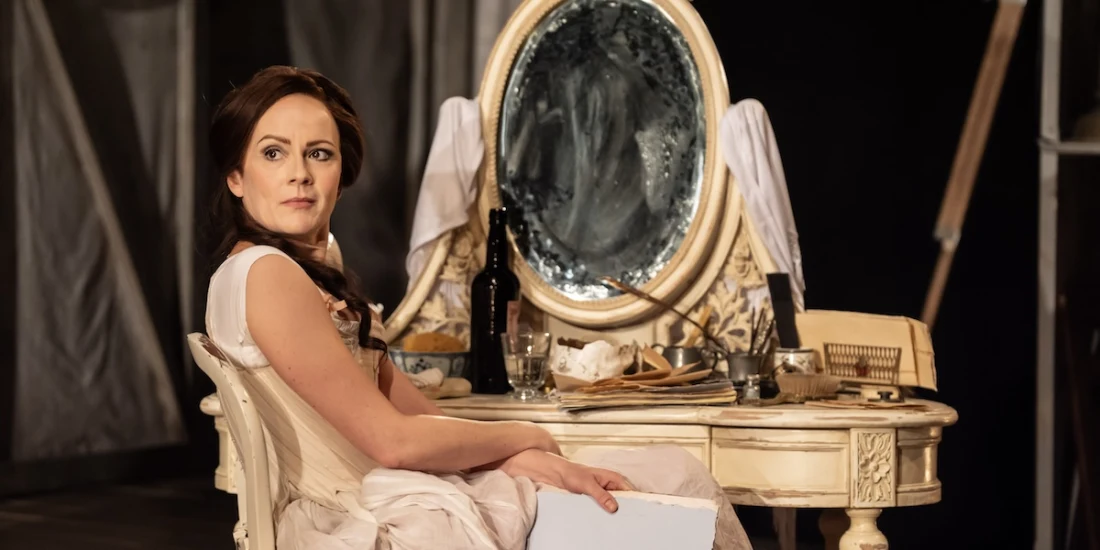'The Divine Mrs S' review – Rachael Stirling commands the stage in this portrait of a pioneering actress
Read our review of The Divine Mrs S, April De Angelis's new backstage comedy, now in performances at the Hampstead Theatre to 27 April.
The British theatre likes to sift through its past, and why not, given that the stage has long been – and remains – one of this country’s glories?
That accounts for the success of The Motive and the Cue, this year’s frontrunner for the Olivier for Best Play. One could also mention such disparate titles over time as The Dresser, Red Velvet, Mr Foote’s Other Leg and the Hampstead’s current offering, The Divine Mrs S, which tells of the noted tragedienne about whom surprisingly little is known.
April De Angelis’s play is set in and around the Theatre Royal Drury Lane in 1800, where Mrs Siddons is seen giving her gender-flipped Hamlet. Her defining Shakespearean role was as Lady Macbeth, though De Angelis suggests Siddons as the muse behind the Gothic tragedy De Monfort written by a Scotswoman, Joanna Baillie, at a time when women didn’t attempt such things. (Eva Feiler is a scene-stealing Baillie, one of four roles she juggles during the evening.)
At first, the tone of Anna Mackmin’s production, beautifully designed with a lightness of touch by Lez Brotherston, is at once breezy and overripe. Rachael Stirling’s throaty Siddons possesses a natural authority and command, even when collapsing to the ground in one of several fainting spells.
She is out-pomped, if one can put it that way, by her younger brother John Philip Kemble (Dominic Rowan, aptly fruity), a vainglorious actor-manager with a notably poor memory for those in his employ. The ever-florid Kemble is forever having to be re-introduced to Anushka Chakravarti’s Patti, Siddons’s young dresser on whom her rapacious brother makes disconcerting, #MeToo-adjacent advances.
We learn, too, of Siddons’s suffering at the hands of an (unseen) philanderer of a husband and of her need to curry favour both with the reigning censor and critic – two different people – of the day. Mrs Larpent (Sadie Shimmin), the censor’s wife, does her husband’s bidding for her and turns out to harbour a rather, um, notable fondness for Mrs Siddons beneath her formidable facade.
The second act acquires greater thematic heft, even as one tires of De Angelis’s habit of having Siddons step out of the play in order to narrate her role within it. A metatheatrical playfulness tends mostly toward the coy, not least when Mrs Siddons impatiently wills the interval into being not once but twice.
At the same time, De Angelis rightly reminds us of the pressures imposed upon women to know their place and not transgress. Joanna Baillie worries lest the revelation of her gender scupper her play, and we are informed of the scarcity – a lack every bit as applicable now as it was then – of challenging roles for women older than 25. (Siddons at the start is 42, though she pauses before adding the digit 2 to the initial report of her age.)
Theatrical in-jokes abound, not least a very funny one about the need to be polite to actors, no matter what you actually think of their play (I’ll keep that in mind), and it’s amusing to see the rehearsal process itself explained for those unfamiliar with it. Titus Andronicus gets described as “an experimental tragedy about a pie.”
The material, too, couldn’t be better served than it is by the smart, sleek Stirling, who proved last year at the Donmar in Private Lives that she is a dab hand at period comedy in a play that here rewinds the clock much further back than Noel Coward’s classic.
As a vehicle for a fine actress, De Angelis’s play is of real value. The rest feels a draft away, still, from properly robust realisation as more than an exercise in theatrical insider trading that might actually transport an audience somewhere divine.
The Divine Mrs S is at the Hampstead Theatre through 27 April. Book The Divine Mrs S tickets on London Theatre.
Photo credit: The Divine Mrs S (Photo by Johan Persson)
Originally published on

